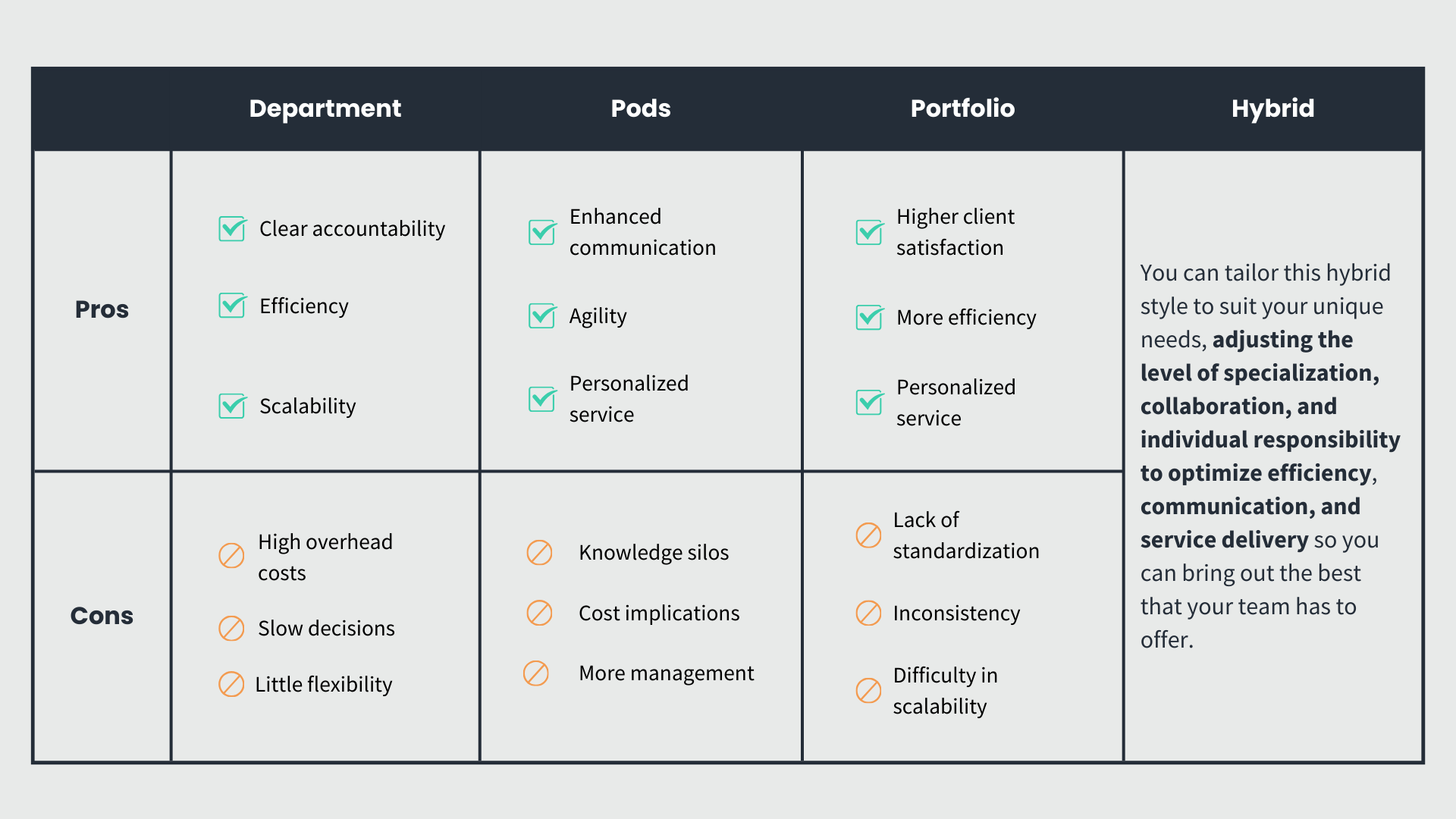You’re 70% more likely to outperform your competitors with an organizational structure that prioritizes speed and stability, according to this McKinsey report. It’s smart to understand how to organize a property management company so you’re set up for success because the property management industry is steadily growing year on year—this is the perfect time to catch this wave and surge ahead.
Section 1 – How to Structure a Property Management Company Team
Operations Team
There are no rules to how and when you should split your company into organizations. Every company is different and you’ll have to find out what works for you through (often difficult) experimentation.
However, property management teams USUALLY adhere to these basic organizational styles. They all have their unique styles and advantages, so let’s understand them.
a. Department
Property management companies organized by departments excel in promoting accountability within each specific department. This facilitates easier problem identification and resolution, as adjusting or replacing team members doesn’t disrupt the company’s overarching structure.
Each department handles a specific part of the business which lets you hire specialized professionals.
Advantages:
- Clear accountability: With distinct departments and roles, it’s easier to identify responsibility for tasks, achievements, or issues. This clarity can improve performance monitoring and feedback.
- Efficiency: Tasks and responsibilities are clearly delineated, reducing overlaps or gaps in work. This clear division can streamline operations and enhance productivity.
- Scalability: As the organization grows, it becomes easier to add new departments or expand existing ones, making departmental structures scalable.
Disadvantages:
- High overhead costs: departments can be difficult to maintain because they need a minimum amount of people to perform optimally.
- Slow decisions: Communication between departments is slow given the number of people involved in the process.
- Little flexibility: In highly departmentalized structures, it may become challenging to reallocate resources quickly in response to changing organizational needs.
b. Pods
Pods are small squads of employees (usually in groups of 3) serving a small number of rental investors. Each pod manages around 150-200 rental units and handles everything related to their management, including resident applications, resident relations, landlord relations, maintenance coordination, and turnovers.
It’s typical for one pod member to handle one of these sectors. If necessary, they can be supplemented with junior members to help them with repetitive tasks.
Advantages
- Enhanced communication: By working closely, pod members can foster better communication, ensuring that everyone is on the same page regarding property issues, resident concerns, and more.
- Agility: Smaller teams can adapt and respond more quickly to changes, be it an urgent maintenance ticket, a common work order, a turnover, or a client request.
- Personalized service: Unlike departments, pods can offer more personalized service to both residents and property owners, as they have a deeper familiarity with their assigned properties and stakeholders.
Disadvantages
- Knowledge silos: If not managed well, pods might operate too independently, leading to a lack of knowledge sharing across the organization. This can be problematic when high-quality employees decide to leave the team. This also leads to pods being inconsistent with the way they deal with their clients.
- Cost implications: Depending on the property management company’s size and structure, setting up and maintaining multiple pods might be more costly than having a centralized team, especially if there’s duplication of resources across pods. If a pod isn’t operating at its full capacity of clients, it automatically becomes a liability.
- More management: A pods-style property management business is generally harder to scale due to the complexity of dealing with multiple pods.
c. Portfolio
Under this style, a property manager is given a rental portfolio to manage. Managers can become experts in their portfolio, understanding the unique needs and characteristics of each property they attend to.
Advantages:
- Higher client satisfaction: Owners and residents appreciate having a dedicated property manager who understands their specific needs and preferences and has a history of working with them.
- More efficiency: Having a single point of contact for all aspects of a property can streamline communication and decision-making.
- Personalized service: Property managers can offer more personalized and consistent service to owners and residents.
Disadvantages:
- Lack of standardization: Without standardized processes, each manager might develop their unique way of managing properties, which may hinder management and training.
- Inconsistency: Different managers might have varying levels of efficiency, expertise, and distinct approaches, which leads to inconsistencies in service delivery for the same company. Replacing property managers can be a hassle, making this downside more significant. When a property manager is unable to work for any reason, no one else in the company is able to provide the same level of satisfaction to the clients.
- Difficulty in scalability: As the portfolio grows, the manager might find it challenging to maintain the same level of attention and service to each property.
d. Hybrid
Every business is unique. The management styles mentioned above may not be the perfect fit for everyone, which is why you should try to see what works for YOUR company.
For instance, managers can handle diverse properties but collaborate with specialized departments or pods for tasks like maintenance or resident relations.
You can tailor this hybrid style to suit your unique needs, adjusting the level of specialization, collaboration, and individual responsibility to optimize efficiency, communication, and service delivery so you can bring out the best that your team has to offer.
Key Takeaway
Departments, pods, and portfolios are the main management styles that property management companies employ. The property management company structure you select depends on you and your team’s needs. Any of the mentioned styles could be your ideal fit.
Regardless of your company’s size, hiring remote team members is an easy and pragmatic way to maximize your ROI.
How to Organize a Property Management Company’s Marketing & Sales Team
If you have a small team with less than 10 employees, it’s best to have a single person taking care of all the marketing. The same goes for sales, with a dedicated business development manager (BDM) usually taking care of the process, although this role is sometimes filled by the company owner.
Property Management Organizational Structure: Marketing
- Small Companies (<10 employees): When your property management team is still under 10 people, (for most companies)the most practical solution is to assign some marketing tasks to a team member that is also in charge of other operational tasks, or with a full-time, in-house all-around marketing specialist. For small companies, using ChatGPT for property management marketing is a great idea since it saves time and effort.
- Medium-Sized Companies (20+ employees): At this size, it is common to employ a dedicated all-around marketing specialist. It’s also a good idea to outsource more specialized tasks like SEO or web development to a freelancer or a marketing agency.
- Larger Companies (40+ employees): Having a small in-house marketing team (2-3 people) can streamline your marketing processes and maintain a consistent brand voice. Make sure though that your marketing team can cover general marketing aspects like marketing management, graphic design, social media, content management, email marketing, copywriting, and basic WordPress. However, at this size, it is less rewarding to have a specialist in paid advertising and SEO given their high costs. For these, you can always collaborate with external freelancers or agencies.
When to Outsource
- Specialized Tasks: Even with an in-house specialist, outsourcing specialized tasks like SEO, web development, and design ensures a professional touch and can be cost-efficient.
- Budget Constraints: If your budget is tight, hiring an agency on a project basis can be more economical than a full-time in-house hire.
- Scaling Up: When your company is expanding rapidly, outsourcing can handle the increased workload without the long-term commitment of hiring.
How Many Marketing People You Should Have
- Small Companies: One multifunctional marketing specialist is generally sufficient.
- Mid to Large Companies: A team of 2-3 marketing professionals can handle broader tasks, strategizing, and maintaining brand consistency, supplemented by outsourced specialized tasks.
Property Management Organizational Structure: Sales
Small Companies (<10 employees)
- Start Small: Initially, the business owner or a dedicated employee may take on the sales role, focusing on acquiring new properties and clients.
- One Person Role: As you grow, having one person dedicated to sales can help in concentrating efforts and acquiring more clients effectively.
Medium-Sized Companies (20+ employees)
- Specialized Roles: Consider having a small team of business development managers focusing on acquiring new clients and an operations team for client retention.
- Outsourcing Option: Some sales functions like lead generation can be outsourced to ensure a steady flow of potential clients. You can outsource cold calling as well, and some companies will even set appointments for you, or, you can hire direct talented remote team members as full-time employees to perform this role.
Large Companies (40+ employees)
- Sales Team: A structured sales department with a sales manager overseeing a team of salespeople can be instituted for acquiring new business and upselling to current clients.
- Diverse Roles: Having diverse roles within the sales department in your property management company structure, such as BDMs, appointment setters, and lead generation specialists (who cold call and qualify leads to make your BDMs more effective) can help in covering different aspects of the sales process.
Key Takeaway
Having a dedicated individual for marketing and sales is efficient for smaller teams, ensuring focused and specialized efforts.
However, as the company grows, small in-house teams supplemented by strategic outsourcing and/or a consistent part of your team being remote can better maintain brand consistency and manage specialized tasks, preventing overload and ensuring adaptability in fast-paced market conditions.
How to Organize A Property Management Company Financial Team
Every company, irrespective of its size, should engage the services of a certified accountant.
A certified accountant is integral in maintaining financial accuracy, preparing taxes, and ensuring that the company adheres to all relevant financial regulations, providing a foundation of trust and compliance in the company’s financial dealings.
Outsourcing Your Bookkeeping
Smaller companies often benefit from externalizing their bookkeeping, either through a dedicated bookkeeping company or a part-time freelance bookkeeper.
This approach allows them to concentrate on core operations while ensuring important financial records are property maintained.
In-House Finance Department
- Generally, only larger companies with 40+ staff members will have a dedicated finance department.
- An in-house department allows for streamlined management of the company’s financial affairs.
Need help organizing your company so that it runs on autopilot? BetterTeam Consulting makes that happen for property managers across the US.
Section 2: Property Management Staff
Smaller Companies
In a smaller property management company, with fewer than 10 people, versatility is essential. Individuals often wear multiple hats to cover the range of necessary functions.
The owner might act as the salesperson, engaging clients and driving business development, while local, on-site staff might serve as all-in-one property managers, overseeing various aspects of property care, resident relations, and maintenance coordination.
This multi-functional approach allows small teams to operate efficiently and address diverse needs promptly.
Hiring remote team members is a great way to grow your team while saving up on costs.
Larger Companies
Larger companies, to ensure smooth operation and streamlined processes, typically need to incorporate a variety of specialized professionals in their team.
If you want a FULL LIST of essential employee job roles that ensure your property management company’s success, here’s BetterWho’s highly-detailed property management job descriptions template. We’ve covered a few of them below:
- Property Manager: Oversees all aspects of property management, including leasing, maintenance, rent collection, resident relations, and budgeting.
- Maintenance Specialist: Manages all incoming work orders from start to finish and responds to new service requests, communicates with residents, troubleshoots maintenance issues, and coordinates service with vendors and residents.
- Leasing Specialist: Handles resident inquiries, conducts property showings, screens prospective residents, and prepares lease agreements.
- Resident Relations Specialist: Focuses on building positive relationships with residents, addressing their concerns, and handling resident disputes.
- Administrative Assistant: Provides administrative support to the property manager, handles paperwork, and assists with resident communications.
- Accountant/Bookkeeper: Manages financial records, handles rent collection, tracks expenses, and prepares financial reports.
- Marketing Specialist: Develops and implements marketing strategies to attract potential residents and promote vacant properties.
- Compliance Officer: Ensures that the property complies with local and federal regulations and handles any legal issues related to the property.
- Property Inspector: Conducts regular inspections of properties to identify maintenance needs and ensure compliance with safety and quality standards.
- Facilities Manager: Manages large properties or portfolios and oversees maintenance and operations.
- Customer Service Representative: Assists residents with inquiries, complaints, and maintenance requests.
Section 3: Property Management Paperwork
Much of the organizational load associated with day-to-day operations will be managed efficiently by your Property Management Software. This tool is instrumental in streamlining processes and maintaining order, thereby facilitating smoother, more efficient operational workflows.
It will also have most of the immediate and relevant information regarding your clients that helps your business run on a daily business.
Property Management Document Retention
A well-structured document retention policy is essential for real estate professionals, particularly for property management companies, to navigate varied statutes of limitations and state-specific regulations.
A standard guideline is to retain copies of expired leases for a minimum of seven years, reflecting the federal statute of limitations. However, it is crucial to note the differences in state-specific statutes; for example, Florida has a five-year limit for contract provisions.
The IRS, too, has varying retention prerequisites depending on the nature of the tax documents.
- State Variations: Ensure awareness of and compliance with state-specific statutes on document retention, such as Florida’s five-year limitation on contract provisions and adherence to the Uniform Preservation of Private Records Act where applicable.
- Digital Storage & Regular Backups: Embrace electronic storage solutions and ensure the regular backup of essential documents, while also maintaining necessary paper copies in adherence to state regulations.
- Security & Proper Destruction: Prioritize security, especially for documents with sensitive information, and adhere to legally sound destruction methods to avoid legal repercussions and protect private information.
It is paramount to have a formal, written document retention policy in place, preferably developed with guidance from resources like the National Federation of Independent Businesses.
This policy should assign a specific manager to oversee adherence, prescribe structured and policy-compliant purging of documents, specify secure destruction methods, and implement stringent security measures for sensitive documents, ensuring compliance with applicable laws like the Health Insurance Portability and Accountability Act.
In essence, maintaining a comprehensive document retention policy is not just a legal necessity but also a strategic step to enhance your company’s value which ensures its preparedness for potential business transactions or litigations.
Using Google Drive for Online Document Storage
Opting for Google Drive as your organizational tool is a smart move—it serves as an efficient, virtual filing system, making your professional life more manageable and orderly, particularly if your team becomes larger and you have many team members working remotely.
Recommended Folder Structure:
- Operations: Here, you can store daily operational documents such as schedules, task lists, and protocols.
- Marketing: This is ideal for storing marketing strategies, promotional materials, images, content, and market research.
- Sales: Dedicate this to your sales strategies, scripts, training material, client acquisition data, contracts, and other related documents.
- Accounting: This should hold all financial documents, including receipts, invoices, and other accounting materials.
Each of these folders serves as a centralized location for its respective field, facilitating smooth collaboration and quick information retrieval. It’s about maintaining a balanced workflow and having essential documents accessible at your fingertips.
Section 4: Organize Client & Resident Communication
Organizing communication with clients and residents is paramount in property management. The effective use of technology can simplify interactions and ensure no request is left unattended.
Communication Organization Tools
- Ticketing Software: Implementing ticketing software can help manage and track client and resident communications efficiently, ensuring every concern is addressed timely.
- Dedicated Contact Information: Having specific email addresses and phone numbers for every location streamlines communication, making it easier for clients and residents to reach out with concerns or queries. Make sure you clearly list them on your website as well.
- Website Chat Feature: A chat feature on your website provides an immediate and convenient way for clients and residents to get in touch for quick questions or urgent issues. It also shows potential clients that you’re easy to get in touch with. This feature is very easy to install on your website as most CRMs and ticketing tools have an in-built chat option.
- Website Ticket Feature: Adding an ‘open a ticket’ button on your website allows clients and residents to open tickets effectively, enabling systematic tracking and resolution of issues through your property management software. This makes things much easier for the operations team and improves the investor and resident experience on your website.
Each tool and feature contributes to a seamless communication flow, ensuring clarity and responsiveness in interactions with clients and residents, thus bolstering your company’s reputation for reliability and professionalism. We’ve talked more about PM tools in the article on how to run a property management company, so go ahead and read it if you need more info.
In Summary
In conclusion, keeping things well-organized in a property management company is really important for long-term success and making a profit. Following the guides on how to set up teams, manage documents, and communicate can help your company adapt quickly and work efficiently, giving you an edge over the competition.
Remember, being organized in every area, from how your team works to how you manage documents and talk to clients and residents, is all connected to how well the company runs. By sticking to these organizational tips, your company can maximize profits and stay ahead in the game.
If you’re looking to set up or grow your property management company, our BetterTeam Consulting program is designed to help you achieve your goals as rapidly as possible.





